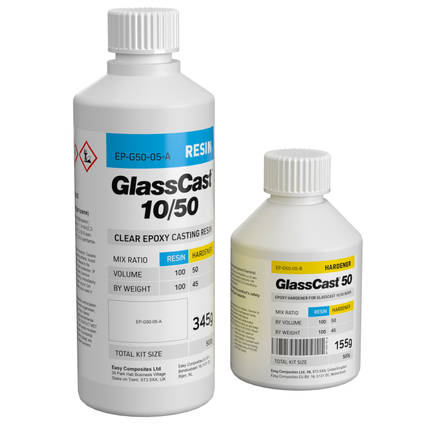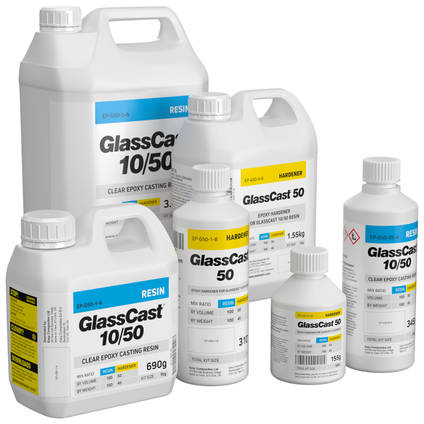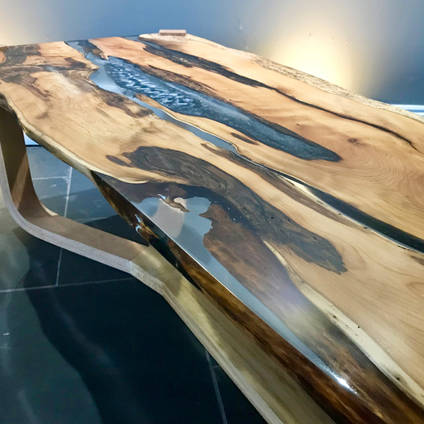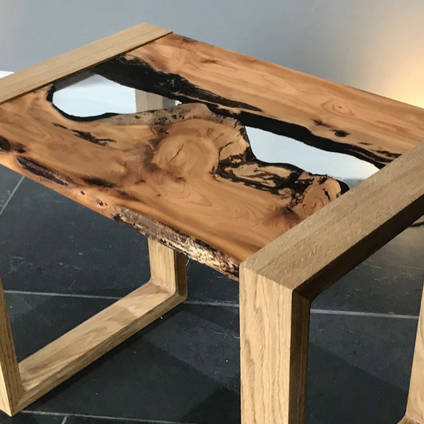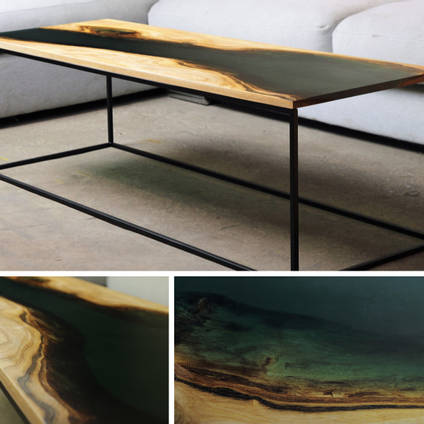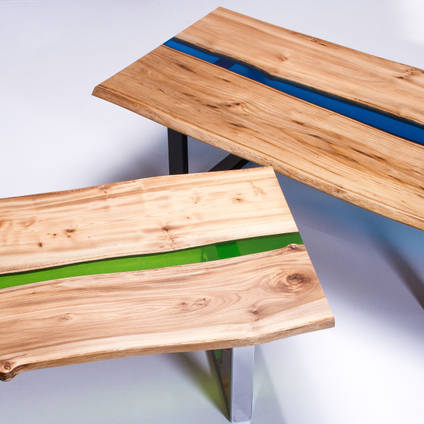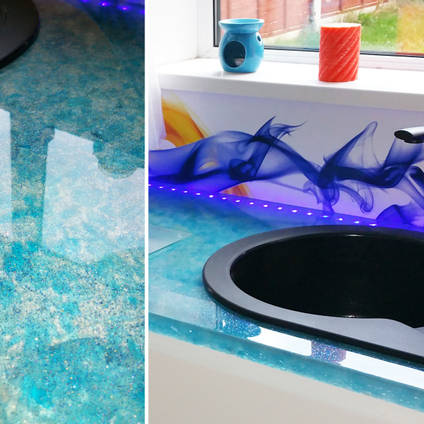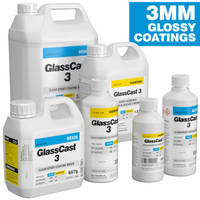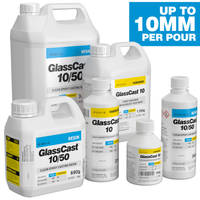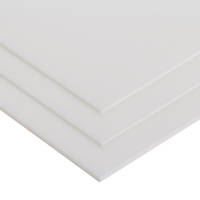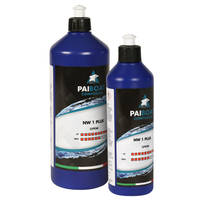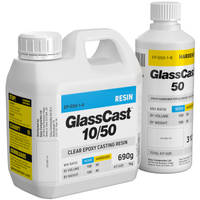Need any help or advice?+44 (0)1782 454499
Downloads (7)
This is a chemical product. Before storage or use you must download and read the accompanying safety and technical datasheets.
| Safety Datasheet (SDS) - EN | ||
| Safety Datasheet (SDS) - NL | ||
| Technical Datasheet (TDS) | ||
| Resin Flowers Kit Handbook | ||
| Less Resin River Table Handbook | ||
| Forged Carbon River Table Handbook | ||
| How To Make a Resin River Table Handbook |
Specification
Product Data
| Colour | Clear | |
|---|---|---|
| Chemistry / Material | Epoxy | |
| Viscosity | 550 | mPa.s |
| UV Resistance | Very Good | |
| Brand | GlassCast | |
| Maximum Casting Thickness | 50 | mm |
| Shelf Life | 12 | Months |
Cured Mechanical Properties
| Max Service Temp | 50 | °C |
|---|---|---|
| Hardness | 83 (Hard) | Shore D |
| Flexibility | Hard / Rigid | |
| Tensile Strength | 51 - 58 | MPa |
| Flexural Strength | 90 - 102 | MPa |
| Flexural Modulus | 2.9 - 3.2 | GPa |
| Elongation at Break | 6.0 - 9.0 | % |
| Tg Onset (DMA) | 51 - 58 | °C |
| Maximum Strain | 4.75 | % |
Pot Life and Cure Times
| Pot Life (Typical) | 60 | mins |
|---|---|---|
| Initial Cure Time | 72 | Hrs |
Weight and Dimensions
| Density | 1.1 | g/cm³ |
|---|
General Properties
| Gross Weight | 0.58 | kg |
|---|---|---|
| Brand | GlassCast® |
Shipping Information
Restrictions
In the currently selected pack size, this product is classed as dangerous goods in limited quantity for the purposes of transport.
Shipping is possible to all UK addresses, including the Channel Islands, without restriction. However, due to being classed as 'dangerous goods', delivery times are not guaranteed on any delivery service.
Shipping to EU countries is now done through our European subsidiary based in the Netherlands. All EU customers should use www.easycomposites.eu.
To check availability of shipping to any other country, add the item to your basket and use the shipping calculator on the basket page.
For a full information regarding the shipment of dangerous goods to all destinations, see our delivery information page.
Package Size
There are no package size restrictions or surcharges for this product.
Delivery Cost
To find the availability and cost for delivery of this item to your address, add it to your basket and then use the instant shipping calculator on the basket page.
GlassCast 50 Clear Epoxy Casting Resin
- GlassCast®
- EP-G50-05
Hazardous
- 4.5/5 Average rating
Professional-use, clear epoxy casting resin designed specifically for thick castings, up to 50mm in depth, such as river tables, knot-hole filling, wood turning, figure casting and more.
GlassCast 50 is easy-to-use, extremely clear, UV resistant, hard-wearing and cures bubble-free; no wonder it's the #1 choice for thousands of professional makers, all around the world.
Available in 500g, 1kg, 5kg, 15kg and 30kg kits to suit all projects.
PRODUCT VERSIONS
Kit Size
AVAILABILITY:More than 20 availablefor immediate shipping
We won’t be beaten on price!
If you believe you’re buying an equivalent product cheaper elsewhere, contact us to discuss your requirements.
GlassCast® 50 is the industry standard in deep-pour water-clear epoxy clear casting resin
GlassCast 50 is perfect for creating thick, water-clear, bubble-free castings up to 25mm deep. It is especially recommended for river tables, knot filling and other furniture projects where you will be casting a very thick layer of resin (up to 25mm per pour) and require the best clarity. It can be layered to create deep castings of unlimited depth*.
Intended for Professional/Industrial Use
GlassCast 50 is a professional-grade product intended for professional use only. Under EU/UK CLP & REACH regulations, it should only be used by professional/industrial users. Before purchase, users must read the product's safety datasheet and ensure that safety precautions are understood and followed.
Typical Uses
GlassCast 50 has been designed to be as easy-to-use and reliable as possible. It does not require degassing or any other special equipment and will thoroughly degas itself during cure, resulting in a perfectly clear, bubble-free casting. GlassCast 50 uses a simple 2:1 mix ratio by volume meaning that it can be measured and mixed accurately requiring only marked buckets.
GlassCast 50 can be poured into insulating materials (such as wood) at thicknesses up to 25mm in a single pour without overheating, distorting or discolouring. If even more thickness is required, multiple layers of up to 25mm each can be poured on top of each other - following partial cure of the previous layer - to create castings of unlimited thickness.
When not pouring into wood (plastic or silicone moulds for example) GlassCast 50 can be poured at thicknesses up to 50mm in a single pour (subject to ambient temperature and other factors).
Glass Cast 50 is incredibly clear, even at thicknesses of 50mm or more and uses the very latest UV stabilising technology to provide industry leading long-term yellowing protection*.
To create stunning translucent colours (like stained glass) just add a few drops of our resin tinting pigments. GlassCast can also be enhanced with a metal powders, glitters and glow powders to achieve a huge range of decorative effects.
Casting Vs Coating
GlassCast 50 has been designed as a casting resin, not a coating resin. This means that whilst it offers the advantage of incredible clarity - even in thick sections - it does not cure with a perfect surface on the open face in the way that our GlassCast 3 coating resin does. However, GlassCast 50 can easily be flatted and polished to achieve a perfectly flat, glossy finish if required (such as the top surface of a river table).
For projects requiring a thin, flat glossy coating - straight from the pour - then our GlassCast 3 coating resin is probably a better option.
Further Information
Ambient Temperature, Pot-Life and Pour Depth
The GlassCast range of resins, in common with all epoxies, generate heat as part of the curing process. The amount of time the mixed resin can spend in the pot, as well as the maximum depth it can be poured at, will vary depending on the ambient temperature.
For best results, we recommend working in a consistent room temperature of 18-20°C. GlassCast can be used in temperatures from 15 to 25°C but higher temperatures will reduce the pot-life and the maximum pour-depth of the resin significantly, as shown in the table below.
| Ambient Temperature | 15°C (minimum) | 20°C (recommended) | 25°C (maximum) |
|---|---|---|---|
| Maximum Time in Pot (Pot Life) | 80 mins | 60 mins | 40 mins |
| Maximum Pour Depth into a thin walled mould (silicone/plastic) | 50mm | 40mm | 30mm |
| Maximum Pour Depth into wood or an insulating mould | 25mm | 25mm | 18mm |
| Initial Cure | 96 hrs | 72 hrs | 48 hrs |
Video Tutorial and Demonstration
We have a highly detailed and informative video tutorial on how to make a river table. You can watch this here: How To Make a Live-Edge Resin River Table using GlassCast 50
Outdoor Use
Despite the very good advanced 'UV' resistant formulation of our Glass Cast resins, we don't suggest using the GlassCast range of resins for permanent, outdoor applications. This is down to epoxy chemistry meaning that eventually, over time, depending on UV exposure, environmental conditions etc, the resins will always eventually yellow in outdoor conditions. How visible this is depends on factors such as the underlying colour and conditions experienced.
IMPORTANT: Maximum Casting Thickness
When casting into wood the insulating effect of the wood (particularly if you also have a wooden base/board) can make it very difficult for the resin to lose heat as it cures. This limits the maximum recommended castable thickness when casting into wood at 25mm. This is particularly important when working in higher ambient temperatures (anything above 20°C).
For a typical 'river table' fill (example 40mm) we would suggest splitting the main pour into 2 layers of 20mm each, this will avoid the possible risk of exotherm during cure and achieve the best possible results.
When casting GlassCast 50 into other materials such as plastic or silicone moulds, it it usually possible to cast up to 50mm in thickness in a single pour.
Suggested Uses
GlassCast 50 can be used for just about any application that requires a water-clear, bubble-free and highly tough resin casting. It is the ideal product for clear casting resin for wood projects and is the perfect live edge river table epoxy resin.
It can be poured as a thick coating over existing surfaces or into moulds made from silicone rubber and of course it can be poured into knot-holes, cavities and gaps between wood for furniture pieces like epoxy river tables.
If you are looking for an epoxy resin to create jewellery - like wood and resin rings, pen blanks or 3D resin art, GlassCast® 10 would be more suitable.
- River tables / knot holes
- Wood and resin combination furniture (lamps, sculptures)
- Clear castings / sculptures
- Encapsulations
- Paperweights
Pigments and Tints
To create stunning translucent colours (like stained glass) just add a few drops of our resin tinting pigments. GlassCast can also be enhanced with metal powders, glitters and glow powders to achieve a huge range of decorative effects.
Our Glass Cast range of resins are compatible with many pigments and colouring powders on the market today. This includes epoxy compatible pigment pastes, various pigment powders and translucent tinting pigments. If the pigment manufacturer is not sure if the pigment is epoxy compatible then a small test should give you the answer you need. We stock a range of pigments that have all been tested and work great with all of our Glass Cast resins. You can find our range of pigments at the links below.
Shelf Life
Shelf life is 12 months from date manufacture. GlassCast should be stored in its original container and out of direct sunlight. It is recommended that the storage temperature should be between 15ºC and 25ºC. Ideally, containers should be opened only immediately prior to use. KEEP THE PACKING TIGHTLY SEALED WHEN NOT IN USE. When stored correctly, the resin and hardener will have a shelf-life of 12 months. Although it may be possible to use the resin and hardener after a longer period, a deterioration in the performance of the resin will occur.
How to Use
GlassCast 50 has been developed for professional users to produce the best results possible. It is not a 'craft' product and not intended for children or home users. Before purchase, storage or use you must read the safety and technical data. Having said that, GlassCast 50 is easy-to-use and delivers fantastic results under a wide range of conditions.
GlassCast 50 should always be mixed, poured and cured at a constant room temperature of around 20°C. Resin and hardener should be mixed 2 parts resin to 1 part hardener by volume (calibrated mixing pots are available).
For castings, GlassCast 50 can be poured into common mould materials such as silicone**, polyethylene and polypropylene without the need for any release agent. For thick coatings GlassCast 50 can be poured directly onto dry surfaces such as metal, concrete and wood following a light 'keying' of the material.
*Additional layer should be poured when the previous layer reaches the B-stage of the cure. If the resin has fully cured the surface on the previous layer must be keyed to ensure a strong mechanical bond.
**Unlike most water clear resins, GlassCast can be cast into Condensation/tin cure RTV silicone rubber moulds without any problems.
See our full instructions on how to use GlassCast 50 to create a stunning resin river table here.
GlassCast® 50 is the industry standard in deep-pour water-clear epoxy clear casting resin
GlassCast 50 is perfect for creating thick, water-clear, bubble-free castings up to 25mm deep. It is especially recommended for river tables, knot filling and other furniture projects where you will be casting a very thick layer of resin (up to 25mm per pour) and require the best clarity. It can be layered to create deep castings of unlimited depth*.
Intended for Professional/Industrial Use
GlassCast 50 is a professional-grade product intended for professional use only. Under EU/UK CLP & REACH regulations, it should only be used by professional/industrial users. Before purchase, users must read the product's safety datasheet and ensure that safety precautions are understood and followed.
Typical Uses
GlassCast 50 has been designed to be as easy-to-use and reliable as possible. It does not require degassing or any other special equipment and will thoroughly degas itself during cure, resulting in a perfectly clear, bubble-free casting. GlassCast 50 uses a simple 2:1 mix ratio by volume meaning that it can be measured and mixed accurately requiring only marked buckets.
GlassCast 50 can be poured into insulating materials (such as wood) at thicknesses up to 25mm in a single pour without overheating, distorting or discolouring. If even more thickness is required, multiple layers of up to 25mm each can be poured on top of each other - following partial cure of the previous layer - to create castings of unlimited thickness.
When not pouring into wood (plastic or silicone moulds for example) GlassCast 50 can be poured at thicknesses up to 50mm in a single pour (subject to ambient temperature and other factors).
Glass Cast 50 is incredibly clear, even at thicknesses of 50mm or more and uses the very latest UV stabilising technology to provide industry leading long-term yellowing protection*.
To create stunning translucent colours (like stained glass) just add a few drops of our resin tinting pigments. GlassCast can also be enhanced with a metal powders, glitters and glow powders to achieve a huge range of decorative effects.
Casting Vs Coating
GlassCast 50 has been designed as a casting resin, not a coating resin. This means that whilst it offers the advantage of incredible clarity - even in thick sections - it does not cure with a perfect surface on the open face in the way that our GlassCast 3 coating resin does. However, GlassCast 50 can easily be flatted and polished to achieve a perfectly flat, glossy finish if required (such as the top surface of a river table).
For projects requiring a thin, flat glossy coating - straight from the pour - then our GlassCast 3 coating resin is probably a better option.
Further Information
Ambient Temperature, Pot-Life and Pour Depth
The GlassCast range of resins, in common with all epoxies, generate heat as part of the curing process. The amount of time the mixed resin can spend in the pot, as well as the maximum depth it can be poured at, will vary depending on the ambient temperature.
For best results, we recommend working in a consistent room temperature of 18-20°C. GlassCast can be used in temperatures from 15 to 25°C but higher temperatures will reduce the pot-life and the maximum pour-depth of the resin significantly, as shown in the table below.
| Ambient Temperature | 15°C (minimum) | 20°C (recommended) | 25°C (maximum) |
|---|---|---|---|
| Maximum Time in Pot (Pot Life) | 80 mins | 60 mins | 40 mins |
| Maximum Pour Depth into a thin walled mould (silicone/plastic) | 50mm | 40mm | 30mm |
| Maximum Pour Depth into wood or an insulating mould | 25mm | 25mm | 18mm |
| Initial Cure | 96 hrs | 72 hrs | 48 hrs |
Video Tutorial and Demonstration
We have a highly detailed and informative video tutorial on how to make a river table. You can watch this here: How To Make a Live-Edge Resin River Table using GlassCast 50
Outdoor Use
Despite the very good advanced 'UV' resistant formulation of our Glass Cast resins, we don't suggest using the GlassCast range of resins for permanent, outdoor applications. This is down to epoxy chemistry meaning that eventually, over time, depending on UV exposure, environmental conditions etc, the resins will always eventually yellow in outdoor conditions. How visible this is depends on factors such as the underlying colour and conditions experienced.
IMPORTANT: Maximum Casting Thickness
When casting into wood the insulating effect of the wood (particularly if you also have a wooden base/board) can make it very difficult for the resin to lose heat as it cures. This limits the maximum recommended castable thickness when casting into wood at 25mm. This is particularly important when working in higher ambient temperatures (anything above 20°C).
For a typical 'river table' fill (example 40mm) we would suggest splitting the main pour into 2 layers of 20mm each, this will avoid the possible risk of exotherm during cure and achieve the best possible results.
When casting GlassCast 50 into other materials such as plastic or silicone moulds, it it usually possible to cast up to 50mm in thickness in a single pour.
Suggested Uses
GlassCast 50 can be used for just about any application that requires a water-clear, bubble-free and highly tough resin casting. It is the ideal product for clear casting resin for wood projects and is the perfect live edge river table epoxy resin.
It can be poured as a thick coating over existing surfaces or into moulds made from silicone rubber and of course it can be poured into knot-holes, cavities and gaps between wood for furniture pieces like epoxy river tables.
If you are looking for an epoxy resin to create jewellery - like wood and resin rings, pen blanks or 3D resin art, GlassCast® 10 would be more suitable.
- River tables / knot holes
- Wood and resin combination furniture (lamps, sculptures)
- Clear castings / sculptures
- Encapsulations
- Paperweights
Pigments and Tints
To create stunning translucent colours (like stained glass) just add a few drops of our resin tinting pigments. GlassCast can also be enhanced with metal powders, glitters and glow powders to achieve a huge range of decorative effects.
Our Glass Cast range of resins are compatible with many pigments and colouring powders on the market today. This includes epoxy compatible pigment pastes, various pigment powders and translucent tinting pigments. If the pigment manufacturer is not sure if the pigment is epoxy compatible then a small test should give you the answer you need. We stock a range of pigments that have all been tested and work great with all of our Glass Cast resins. You can find our range of pigments at the links below.
Shelf Life
Shelf life is 12 months from date manufacture. GlassCast should be stored in its original container and out of direct sunlight. It is recommended that the storage temperature should be between 15ºC and 25ºC. Ideally, containers should be opened only immediately prior to use. KEEP THE PACKING TIGHTLY SEALED WHEN NOT IN USE. When stored correctly, the resin and hardener will have a shelf-life of 12 months. Although it may be possible to use the resin and hardener after a longer period, a deterioration in the performance of the resin will occur.
How to Use
GlassCast 50 has been developed for professional users to produce the best results possible. It is not a 'craft' product and not intended for children or home users. Before purchase, storage or use you must read the safety and technical data. Having said that, GlassCast 50 is easy-to-use and delivers fantastic results under a wide range of conditions.
GlassCast 50 should always be mixed, poured and cured at a constant room temperature of around 20°C. Resin and hardener should be mixed 2 parts resin to 1 part hardener by volume (calibrated mixing pots are available).
For castings, GlassCast 50 can be poured into common mould materials such as silicone**, polyethylene and polypropylene without the need for any release agent. For thick coatings GlassCast 50 can be poured directly onto dry surfaces such as metal, concrete and wood following a light 'keying' of the material.
*Additional layer should be poured when the previous layer reaches the B-stage of the cure. If the resin has fully cured the surface on the previous layer must be keyed to ensure a strong mechanical bond.
**Unlike most water clear resins, GlassCast can be cast into Condensation/tin cure RTV silicone rubber moulds without any problems.
See our full instructions on how to use GlassCast 50 to create a stunning resin river table here.
Downloads (7)
This is a chemical product. Before storage or use you must download and read the accompanying safety and technical datasheets.
| Safety Datasheet (SDS) - EN | ||
| Safety Datasheet (SDS) - NL | ||
| Technical Datasheet (TDS) | ||
| Resin Flowers Kit Handbook | ||
| Less Resin River Table Handbook | ||
| Forged Carbon River Table Handbook | ||
| How To Make a Resin River Table Handbook |
Specification
Product Data
| Colour | Clear | |
|---|---|---|
| Chemistry / Material | Epoxy | |
| Viscosity | 550 | mPa.s |
| UV Resistance | Very Good | |
| Brand | GlassCast | |
| Maximum Casting Thickness | 50 | mm |
| Shelf Life | 12 | Months |
Cured Mechanical Properties
| Max Service Temp | 50 | °C |
|---|---|---|
| Hardness | 83 (Hard) | Shore D |
| Flexibility | Hard / Rigid | |
| Tensile Strength | 51 - 58 | MPa |
| Flexural Strength | 90 - 102 | MPa |
| Flexural Modulus | 2.9 - 3.2 | GPa |
| Elongation at Break | 6.0 - 9.0 | % |
| Tg Onset (DMA) | 51 - 58 | °C |
| Maximum Strain | 4.75 | % |
Pot Life and Cure Times
| Pot Life (Typical) | 60 | mins |
|---|---|---|
| Initial Cure Time | 72 | Hrs |
Weight and Dimensions
| Density | 1.1 | g/cm³ |
|---|
General Properties
| Gross Weight | 0.58 | kg |
|---|---|---|
| Brand | GlassCast® |
We would usually recommend allowing the resin to cure for at least 48 hours before trying to machine it. You will find that the resin machines differently as it continues to fully harden over about a 7 day period. Some turners prefer to do the main shaping work quite early in the cure when the resin is softer and cuts more easily (you'll see the swarf coming off in longer, more pliable peels), but for final finishing (sanding and polishing) the harder and more fully cured the resin is the better; it really doesn't polish well at all until it's really hard after 2-3 days.
Yes you can. Once the 10/150 surface has cured to a B stage, you can use GlassCast 3 directly on top. Alternatively if the surface has fully cured, key it with 120 grit sand paper and thoroughly clean prior to pouring the resin. To get a nice smooth finish, you would need approximately 2kg per square meter to ensure there is enough resin for it to self level evenly. GlassCast 3 used in this way will provide a high gloss and smooth finish that does not need further polishing.
Unfortunately the GlassCast range of resins are NOT designed to be thinned in use.
The resin would not dissolve a 3D printed mould (made using any of the standard polymers) however you will need to think about how you go about sealing the surface of the mould. 3D printed objects tend to have quite a coarse surface that is difficult to release from, even with the use of a release agent. Depending on how coarse this surface is you might need to specifically seal or surface (coat) the mould with something. If you do go for release agent only then I would suggest using something like our Easy-Lease chemical release agent but apply a great number of layers (maybe 10+) in order to achieve a proper build-up of the solids in the release agent. These should help to fill the coarseness of the surface. You would need to test this though because it really depends on the resolution of your printer, the polymer used and what finishing you've done on it.
Uncured resins are classed as dangerous goods and would need to be disposed of correctly. For domestic users, usually your local council recycling centre will have a disposal service for such chemicals or containers.
Because cured resins are inert and safe for disposal it's often easiest to mix un-needed or out-of-date resin and hardener together to cure them. Once cured they can be disposed of with general waste.
Unlike other resin systems such as polyester or vinylester, it's very important to get the mix ratios accurate with epoxies. If you get the mix ratio wrong by a small amount (let's say a couple of grams on a small mix) then the resin will still cure but the mechanical properties won't be quite as good as they would have been if the mix ratio had been exactly right. However, if you were to be out by anything more than a few grams then you might find that the resin would not be properly hard when cured and/or may have a tackiness to the finish. This would result in a much weaker repair and needs to be avoided by careful measurements.
No, we wouldn’t suggest Epoxy Resins for lining a fuel tank. In general, epoxies have good resistance to petrol and many of the chemicals and additives found within pump fuel however the ethanol in fuel is known to cause problems over time and so specialist tank lining resins (often novalac vinylester based) should be used instead. One such product is GTS 1750 which is sold by Caswell Europe.
No, this epoxy in common with other epoxies does not attack expanded polystyrene
We have not specifically saught FDA (or similar) approval for this resin system so if you were to make these plates commercially then you would either need to make a plate using this resin system and then have it tested and approved safe for food use or use a different resin system that has specifically been approved for food use. Mixed and cured fully and properly the resulting plastic should be stable and non-toxic but testing would be required to prove this. Regarding being dishwasher safe; a dishwasher is a very harsh environment (abrasive, high temperatures, caustic) and so I think it would be quite hard on any resin system. By all means conduct your own tests but I would strongly recommend that a carbon fibre plate was not marketed as 'dishwasher safe'.
Above the HDT of a resin system it will soften slightly and its mechanical properties will start to fall away however a thermosetting plastic (like epoxy) is NOT a thermoformable plastic so it will not start to flow again such that you could melt it out of your part. It's more likely to become slightly soft and then possible more brittle again before eventually starting to burn if you too the temperature high enough. It sounds to me like you need a thermoformable plastic (aka a thermoplastic) with a relatively low melting point. I'd suggest something like PCL.
An elevated temperature post-cure is not required for parts made with epoxy resin however, post curing parts will improve the mechanical properties of the resin (and therefore the part) and so if you have the means to do it then it's certainly recommended. One major advantage to post-curing epoxy is that you will raise the HDT (heat distortion temperature) of the part meaning that it's less likely to soften or distort in higher temperatures. This can be particularly important for parts like a vehicle panel (i.e. hood/bonnet) which could get very hot in the sun. Without a post-cure there is a good chance that the part would effectively post-cure itself 'in situe' when it's in direct sunlight which can cause the resin to soften, sink and then re-harden. When this happens to a fitted part it's likely to distort the surface finish. A part that had been post-cured prior to installation would not have this problem.
Epoxy resins have very little odour and so it's quite viable to use them indoors (i.e. in your house) without upsetting anyone. The resin is almost completely odourless and the hardener has an amonia smell which doesn't really carry or linger.
In this respect epoxies are very different to polyester and vinylester resin which has a very strong smell and cannot realistically be used indoors. As always, you should still follow safety precautions and ensure adequate ventilation of your work area.
Although generally cured epoxies are non-hazardous, none of the products we have are certified food safe and thus we cannot recommend their use with food products.
We recommend Acetone. The brushes must be cleaned before the resin has cured. If you can’t get hold of acetone it’s also possible to use methylated spirits or neat alcohol.
In really simple terms you can think of 1kg of the Epoxy Resin as being 1L. If you want to be really exact (for example if you want to mix the resin and the hardener by volume and not by weight (which we don't recommend because it's unnecessarily complicated) then the relative density of the resin and the hardener, and the mixed product, can be found on the technical datasheet.
We can send any quantity of resin to Portugal. We would use a TNT Road service. To find the shipping cost for any item, simply add it to your basket and then click the 'Estimate Shipping' button on the basket page. The price will then be shown once you chose your shipping country (Portugal).
The B stage of the cure is when the resin has cured enough to be firm but still tacky. When touching with a gloved finger, the resin should feel tacky but not leave any residue on the glove.
Epoxy is sensitive to low temperatures so we would not attempt to try and cure the resin at very low temperatures such as below 15 °:C. At those temperatures, the cure time will be lengthened considerably.
One of the most significant problems caused by low temperatures (much below 20°C) is that the resin will be considerably thicker which affects its ability to self-degas after pouring.
Also, curing epoxies are hydroscopic so the low temperature environment may well leave the resin vulnerable to absorbing moisture, especially if the environment is relatively damp or high in humidity as can be found in some outdoor workshops or home garages.
As a result, for best results we always recommend working in an environment that is 20°C or above.
We would not recommend this resin for casting over projects such as a penny floor. However, we do have the perfect resin designed just for this application, our GlassCast Clear Epoxy Surface Resin.
Our GlassCast is a remarkable clear epoxy resin developed specifically to provide a beautiful, hard wearing, clear gloss surface for tabletops, bartops, decorative floor effects, furniture and creative projects, including projects such as your coin floor. The finish is very clear and has a high level of UV resistance so should look amazing for years to come.
Any mild soap and detergents will be fine for cleaning GlassCast Resin. Try to avoid strong acids or bases or neat cleaning products as it is possible they may dull the surface finish.
In its in-mixed state (i.e. a bottle of resin and a bottle of hardener) then both parts should be considered toxic and handled appropriately (wear gloves and eye protection, work in a ventilated area, don't ingest etc.). Once the resin and hardener have been correctly mixed and fully cured then the end result is a stable and inert plastic that is not toxic. Being non-toxic is different from being FDA approved or 'food safe' however so we don't suggest making cups or plates but as a general description the cured end result is just a stable plastic material.
The GlassCast range of products are not designed for permanent outdoor use. Although the GlassCast resins have a very high level of UV resistance, the very high levels of UV exposure and the variety of inclement weather and environmental conditions experienced mean that the resin would degrade if permanently used outdoors.
Certainly, we can sell the resin and hardener separately if you need extra of either one one its own. Although not listed on the website we can do this over the phone or you can email us and we can send you an invoice with the correct amounts on it. The hardener for each of the GlassCast products is unique for that product. Using hardeners from other resin systems will cause serious curing issues or it may not cure at all.
All of our epoxy resins (including the GlassCast range) are safe to use on and will NOT dissolve or eat into styrofoam or any other polystyrene based foam.
Although fully cured epoxies are inert and unlikely to pose a hazard, none of the GlassCast range of resins are officially certified food safe and as such we cannot recommend their use where you would need the product to be certified food safe.
As long as the paint has fully dried then we would expect there to be no problems with the GlassCast range being applied over the water based paint.
Hi Nicole, this would slightly depend on how you'll be making up that total depth. Generally speaking, flower preservation castings are done in at least 2 pours often more. At the very least, the first pour is usually used to provide a clear 'shelf' on which to position the flow so that it appears suspended in the final casting.
If you're doing multiple pours on a casting that will be a total of 7cm thick then it will probably mean that no single pour exceeds the 50mm maximum (per pour) for GlassCast 50 (when pouring into a mould) and so you could use GlassCast 50.
If you wanted to do the whole depth (50mm or more) in a single pour however then you would need to choose the GlassCast 50 PLUS. 50 PLUS allows you to cast up to 100mm (into a mould) in a single pour with a lower risk of the resin over-heating during its cure. This makes it great for big/deep castings and would make it a good choice for 50-70mm flower preservations but the trade off is that it does mean that it takes a lot longer to cure; around 7 days compared to 48hrs for GlassCast 50.
You could use ketchup-style hand pumps to dispense GlassCast 50 but there are a few things to consider if you do. Firstly, using the pumps to measure the correct quantities of resin and hardener generally isn't as accurate as measuring them properly using a container of known volume or measuring cups. The reason for this is that - due to the viscosity of the resin - it's possible for the pumps to 'cavitate' and dose out air as well as resin, with each stroke. If you're counting strokes (two resin to one hardener) then your accuracy can be affected by this (especially as it can happen more with the thicker resin than the thinner hardener. One solution to this would be to just use the pumps to dispense the resin, but still measure it using lines/calibrated cups etc.
The other consideration is whether the pump heads are suitable as 'closures' for your resin, in terms of shelf-life and contamination etc. In this regard, the pumps aren't really a problem and as long as you discard the first few millilitres that come out of the nozzles if they've sat around for a few days, the resin that comes after should be fine and won't have be any different than if you had the normal lid on the container. Likewise, shelf-life would be unnaffected but the longer you leave resin or hardener in the pump itself, the more of it you'll need to discard when you start using it again - for example, after a few months sat in the pump-heads, you might want to discard a full stroke of resin.
The 15kg kit is made up of two 5.17kg resin packs and one 4.66kg hardener pack. You do not have to use the whole container in one go, you can decant it for each pour and reseal after use. It should be fine for the 12 month shelf life if properly resealed.
Hi Jess, the short answer would be no, we wouldn't recommend GlassCast 50 for such a chunky casting in a single pour, but there are ways you could do it.
It's all to do with preventing the resin from over-heating during the cure. Generally we state a maximum thickness of 50mm (2") for GlassCast when you're casting into a conventional mould (rather than into an insulating material, such as wood - as in the case of a river table, for example). However, since you only need a little more thickness (2.5" rather than 2"), if you put some measures in place to take the heat away from the reaction, such as a strong fan blowing over the whole mould, and work in cooler conditions (15C would be ideal) then you would be able to increase the thickness that you can cast without overheating and be able to do your rose casting in one go.
HDPE is a very chemically inert low energy plastic and as such, in a similar fashion to polypropylene, nylon and PVC, resins will not stick to HDPE.
GlassCast 50 has a maximum working temperature of 55 °C which is much lower than the radiated heat given off by some fireplaces. As such we would not recommend keeping it too close to a fireplace or fire to avoid damaging the resin.
Nonetheless, you should avoid breathing in any odour/vapour in close proximity (i.e. smelling the containers) and of course if you may make your own decision to wear a vapour mask.
Yes, once the GlassCast has fully cured, you should be able to paint over the top no problem but it will depend on the type of paint that you're using. Cured GlassCast is essentially a plastic so you're likely to need to use a two-pack paint like a polyurethane or an acrylic to get a really good bond. We would certainly recommend 'keying' the GlassCast with abrasive paper and then testing a small area first to check the quality of the bond.
Although you could use GlassCast 50 to make a decorative ashtray problem, heat from a cigarette butt would degrade and damage the resin surface over time meaning we would not recommend it for functional use.
Yes, sure. You could do all your measurements in inches which would give you a volume in cubic inches; for example 39 inches long, 3 inches wide, 1 inch deep = 39x3x1=117 cubic inches.
You then need to convert cubic inches into litres, which means multiplying your number by 0.0163, so: 117x0.0163 = 1.907 litres.
For simplicity, we would say to consider litres as kilograms, meaning that you would need 1.907kg of resin for my example calculation.
Of course, the the other way to do it is to convert your inches measurements into metres and millimetres and then first and then follow our calculation. Both will get you to the same place.
...I'm looking for clear resin for coasters and tables which can hold hot plate or mug.
The maximum working temperature for GlassCast 50 is 55°C. GlassCast 50 could be marked by hot objects such as very hot drinks (think fresh black coffee, no saucer). To improve the heat resistance of your GlassCast surface, an elevated temperature post-cure should be undertaken. Even with the post-cure we would recommend being careful about placing down hot cups and items, ideally allowing them to cool first or use a saucer just to be on the safe side.
...for example, on top of my table I would like to have a clear glass top (that would stand heat) and then the GlassCast resin would be underneath so that the glass top and resin river are bonded together as one.
Good question! Yes, in principle this can be done but there are a few considerations and so the answer can be quite complicated. GlassCast work great to bond actual glass to a table top (which has a river table). The things to think about would be the expansion and contraction of the wood which could (potentially) have enough expansion to crack the glass. Very few people have tried this so I don't know if it actually would ever crack the glass but it is possible in other situations where wood is locked rigidly to glass. Another thing to think about would be air entrapment under the glass. You would need to do some experimentation with ways to put the glass down into the resin without getting any air bubbles underneath the glass. However, if you can work around these considerations then you could have a great solution to a super-hard wearing, temperature tolerant surface.
No, GlassCast 50 is designed for thick castings, not thinner coatings and as such it does not have the perfectly smooth glossy surface that would be better for a floor. A the product for a floor would be our GlassCast 3 Clear Epoxy Coating Resin which is self levelling and cures with a perfect flat gloss finish, great for flooring projects like penny floors and decorative resin floors.
GlassCast 50 is ideal for larger pen blanks where it's clarity and ability to be poured up to 50mm is ideal. Once cured for a minimum of 48 hours, the pen blank will be ready to machine and turn.
For shallow water effects where a smooth surface is desired, then we would recommend our GlassCast 3 Clear Epoxy Coating Resin as for shallow depths under 10mm, it gives a smoother surface finish than the other GlassCast products. For deep water effects well over the 10mm, then our GlassCast 50 would be ideal.
Although you can use HIPS as a mould with epoxy resin (such as GlassCast) you would need a release agent such as our Easy-Lease Chemical Release Agent to ensure the resin does not stick to the mould. If it is a simple shape, then a tub made from Polypropylene or HDPE might be a better solution as the resin does not stick to the plastic. A lot of 'Tupperware' and storage boxes are PP or HDPE.
As long as you reseal the bottles promptly after use and store them in accordance with the datasheet, then we would expect you to still achieve the full 12 months shelf life.
In common with most thermoset plastics, once mixed and fully cured, GlassCast is an inert cured plastic and poses no environment risk. It doesn't biodegrade however (not in any modest timeframe) and is not currently recyclable.
Explaining the manufacturing processes for a formulated epoxy, in any meaningful detail, is a little beyond the scope of a simple Q&A but - like almost all plastics - epoxy resin raw materials are petrochemical derived.
GlassCast would be clear enough for this application, but more generally, an application like a mirror requires a level of flatness and perfection that even GlassCast wouldn't have. As a glossy coating, its flatness and clarity are second-to-none but as a replacement for glass in an actual optical mirror I don't think any clear resin would be adequately flat to produce an undistorted reflection.
Yes you can layer the resin in that way. The ideal method is to pour the second and any subsequent layers when the first layer has become firm but is still tacky. At this stage no further preparation is needed and you are likely to get an almost invisible join line.
If you need to wait until after the first layer has fully cured, then the resin will need a key with sand paper and a thorough clean before pouring the next layer.
The load is taken by the wood reinforcement so a 1mm sheet will be fine.
GlassCast will stick to many surfaces including stone and concrete. Where surfaces are smooth, it is recommended to key the surface to aid maximising adhesion.
It's worth noting that if you want a resin to 'coat' materials like stone or concrete then the GlassCast 3 Coating Resin would be a better choice. GlassCast 50 is designed for very thick section casting (up to 50mm) but would require polishing on the open surface to achieve the perfect flat gloss finish of GlassCast 3.
Yes, GlassCast 10 and GlassCast 50 are not as sensitive to moisture as many types of clear casting resin and therefore can be used in silicone moulds made from either 'addition cure' silicone or 'condensation cure' silicone (such as our CS25) without any problems.
Yes, GlassCast 50 can be used to cover the top of the project as well as the deeper sections. The cured surface finish of GlassCast 50 is not quite as perfect as the GlassCast 3 (which is designed specially as a 'coating resin') but for most applications you would probably be perfectly happy with the surface finish straight from the GlassCast 50 pour. If you do need absolute perfection then you can always flat and polish the surface, which is quite easily done with GlassCast 10 and 50.
Yes GlassCast 3 can be used in this way. If you are making a river table and want a thin layer of resin right over the top of the wood as well, then using GlassCast 3 in this way over the top of the GlassCast 50 will give a smoother finish on the surface.
Yes... within reason. GlassCast 50 is capable of giving a very thick surface coating to a worktop in a kitchen no problem. With proper preparation, the end result should look amazing however it's important to consider the limitations of a resin coated work surface.
Generally kitchen work tops are subject to high levels of wear and tear which will in time may scratch and dull the surface finish of the GlassCast surface but this sort of wear and tear can usually be polished out to restore the finish.
The main consideration for a resin coated kitchen worktop is temperature, especially hot pans/plates etc. which would certainly mark the surface if they're placed directly onto it. As a result, you will need to use pot stands/trivets to prevent excess heat being conducted into the resin.
Typical kitchen worktop cleaners are unlikely to cause any issues to the resin surface. However, care should be taken to avoid the use of scourers and similar abrasive materials as it may scratch the resin over time. Should this occur over time, then a quick polish should be all that is needed to restore the finish back to a high gloss
If you are looking for a thinner (3mm or less) surface coating over your worktop, then the same advice still applies, however our GlassCast 3 Clear Epoxy Coating Resin is a better choice for the thinner pours.
After allowing a minimum of 48 hours curing time, the GlassCast 50 can be machined, cut, sanded and shaped no problem. Once finished you will be able to polish the resin back to a very high gloss.
There are no known issues with encapsulating LED's in resin in terms of curing or using the resin. The only area of concern is ensuring the LED cluster is fully working before pouring the resin and also long term maintenance - any failed LED's would be unable to be replaced.
You can certainly use tints and pigments when working with LED's. The way the LED diffuses the light may effect how the overall piece looks.
You could use the GlassCast 50 for this purpose but unless you're going for a very thick coating (10mm or more) then we would normally recommend our GlassCast 3 Clear Epoxy Coating Resin the most suitable product for your project.
This usually occurs when you're doing particularly deep pours and generally when the mixing has been quite vigorous and resulted in a lot of smaller air bubble entrapment. Smaller bubbles are more difficult for the resin to release because they have less buoyancy compared to their drag (less volume as a ratio to their surface area).
To reduce the air entrapment in the first place the solution is to mix more slowly and purposefully, making ever effort you can not to 'whip' air into the resin. Also, make sure that the resin is at a starting temperature of 20°C when you mix it. If the resin is cooler then it will be thicker and more prone to air entrapment when mixing. To help to eliminate the air that does get mixed into the resin it's helpful to pour the resin a bit at a time, using a hair dryer or heat gun gently each time you add some more resin. This way the air bubbles don't need to rise as far and the affect of the heat gun can penetrate each shallower pour of resin more easily. This isn't the same as making up the depth in multiple pours (allowing the resin to cure between each pour). What I'm describing is just pouring out maybe 5mm, then gently hair-dryer, watch the bubbles pop, pour another 5mm and keep going.
The risk from deep pours (deeper than 25mm) is that the resin could exotherm (overheat) during the cure which can cause it to crack, distort and discolour. If the resin doesn't get into this overheating spiral and stays relatively cool during the cure then there is no disadvantage to deeper pours. We have one customer who regularly manages 50mm depth in a single pour by positioning big fans blowing air over the table to keep the resin temperature down.
Small defects in the Glasscast finish can be cut/drilled out and then refilled to repair the damage. However it is essential that you thoroughly clean the area being repaired before you refill with resin to avoid any dust or dirt being trapped.
Yes you can clean the surface in that way or by using pre-made IPA wipes. Bear in mind, you will still need to key the surface with 120 grit sand paper before cleaning to ensure the best bond between the resin layers.
The ideal product to bring back the shine is our NW1 White Super Cutting Compound will take a 1200grit surface to a glossy finish.
GlassCast 50 is very much a rigid resin once fully cured and as such would not be considered to have any noticeable flexibility.
Good question. It's hard to say for sure because household clingfilm can actually be made from a number of different types of plastic and therefore have different release properties. In the past we have seen GlassCast release from some clingfilm but on other occassions it seems to have well and truly stuck. Therefore, the only firm advice we can give you would be to test a small area first in order to see if it releases from your clingfilm.
One other option to consider if you're looking for a low cost release material is brown packing tape. Packing tape/parcel tape is almost always made from polypropylene which GlassCast doesn't stick to so you're pretty safe if you cover something in brown parcel tape, rather than clingfilm.
20C is definitely the recommended working temperature but there is a bit of leeway on this. With GlassCast 50 I would suggest that 15C would be the minimum acceptable working temperature.
What you'll find when working at lower temperatures is the that the resin and hardener will both feel thicker than they normally would; this can mean that more air gets mixed in when you mix the resin and hardener together and so it becomes more important to mix carefully to avoid aerating the resin when mixing and also maybe a bit more thorough with the heat-gun or hair dryer when removing bubbles from the poured resin. The other affect you'll see in cooler conditions is that the resin will take longer to cure than we state on our datasheets/tutorials etc although other than a bit more patience, this is not normally an issue.
Just for completeness in the answer, working at temperatures much higher than 20C is more of a worry because of the risk of the resin over-heating during cure. If you do ever find yourself working at higher temperatures then you would need to reduce the maximum casting thickness from 25mm to something more modest.
Yes, you can definitely do this with GlassCast 50 but there would be a couple of things to think about when you do. When casting into a mould (including your sphere mould/container) GlassCast 50 can be used for sections up to a maximum of 50mm thick. It can be tricky to explain but what we mean by 'thickness' is the smallest of the 3 dimensions if you could measure the resin block (or the gap where the resin will be) in all 3 directions (example: width, height, depth). If the resin will be more than 50mm in length, AND width, AND depth at any point then you would need to pour the resin in layers, to avoid it over-heating whilst it cures. If - because of how much space the burl takes up - the resin wouldn't ever exceed 50mm in all 3 dimensions anywhere on the casting then you could do it in one pour.
In terms of then turning down the piece once cured, you'll have no problem. We have lots of beautiful examples of similar pieces in our gallery.
ASK YOUR OWN QUESTION
Customer Product Reviews for GlassCast 50 Clear Epoxy Casting Resin
Perfectly clear, bubble-free resin that produces consistent results. As a premium product, it does suffer with crystallisation, but always returns to water clear after sitting in 60+ degree water for a while. Minimal shrinkage is also a big plus point.
Fantastic product, great at degassing for bubble free castings, good machinability when cutting, turning or shaping/carving.
Great. Super happy. Fast delivery (came next day) and thanks to Charlotte in the office who helped me to find the delivery (at my own house!!
I've been using glass cast 50 since the beginning and have now produced nearly 20 river tables and similar projects. I tested a few other resins in the beginning and settled on glass cast 50 because of the cure speed and bubble free finish. Other resins I tested for river tables were much too slow to cure. One took a week to cure and still felt too soft to machine properly. Great product.
TOP PRODUCT!! have used Glasscast 50 for 3 river tables now, they have all worked perfectly and great technical support from Warren who helped me figure out a problem I was having with tiny air bubbles (was caused by jiffy mixer - dont use one!). Great product, great service.
brilliant product, really happy with the end result, did exactly what it said on the tin. only reason I didn't give 5 stars is because it would have been better if I could buy a 2.5kg kit, the 5 was too big and the 1kg is too small.
No comparisson! Glasscast 50 is the only epoxy resin i will use for my river tables. quality of the product is spot on - bubble free, cures hard, machines great, polishes great. What more can I say? 5 star product.
I have been working with resin for quite a while now, using various resin products, with varied results. After trying GlassCast, I have found a product I'm sticking with. Easy to work with, easy to finish. Night and day from others I have used. Highly recommended.
Highly recommend! Great products supplied via great service. Top quality all round. Will be staying with GlassCast and not even tempted to look elsewhere!
Very good resin, very clear. I use it to top my work but can use normally.
Loving the Glasscast 50! Super clear castings without bubbles. Perfect for woodturning.
I use a combination of GlassCast 50 for the deep pours I do and GlassCast 3 for finishing and flood coats. I love the products and the service I receive from the team. A score of 5 is not high enough for the quality and service you get from the team!
Never used resin before and after some research and talking to the team they advised GlassCast 50 Clear Epoxy Casting Resin suited my needs and guided me through the process. There are many variables when pouring resin and I found GlassCast 50 easy to use, I would recommended the GlassCast range of resins.
I’m a floral resin artist and would give glasscast 5/5, and more if possible. I use glasscast 10 and glasscast 50 and it’s by far the clearest resin I have found. Very easy to work with and I wouldn’t hesitate in recommending this brand to other floral artists.
I can always guarantee the standard when using GlassCast, it’s the resin I recommend wholeheartedly and I wouldn’t use any other for my business. Resin art and product creation is vastly growing in popularity, so in an increasingly competitive market, I need that confidence in the quality of materials that I’m using. GlassCast 3 is perfect for my Artworks and home decor pieces, and GlassCast 50 never fails me when it comes to casting and preservation products. My only complaint would be that I’m constantly running out, but thankfully they offer speedy delivery also!
GlassCast 50 has been a game changer for me. It's the prefect product to help me create unique functional art , allowing me to use all of the locally sourced trees including there natural defects to make something truly unique.
I have used quite a few different resins but I always seem to always come back to GlassCast Resin. I find it to be a really easy resin to use and cast with. It’s particularly good for crystal clear casts even without the use of a pressure pot (you need to know a few tricks though). I push this resin quite far and pour deeper than the recommended depth and it always copes well and surprises me. It is very competitively priced along with similar resins and cheaper than some of the “big” names in resin/epoxy.
I took the plunge and changed resin company. GlassCast grabbed my attention from the start. Made it really easy to understand which type of resin to use for what job. and I've never looked back! Clear, easy to work with. Minimal bubbles and cures with perfection.
Easy to use resin. It was solid as 24 hours, rock hard at 36 hours. Benefits from a hot water bath before mixing for less bubbles. Crystal clear pour after putting into into a vac chamber to remove bubbles.
Follow the instructions for great results. Very pleased with the Glass Cast 50. Used it for trialing some wood coasters with small items cast in to hollow parts. Followed the instructions and got great results.
Love this stuff, just stir it properly and let sit before pouring. I blowtorch it before I pour. (easier)
Love the GlassCast range for my projects. Highly recommend.
Great casting product. Lovely product to use , easy to measure and little odour . A little more expensive than other brands but I find this the best after trialling others. Good clear finish and excellent quality product to sell .
Fab product, great to use.
Used to set pencils and used for wood turning worked out great. Easy to use and follow instructions.
This resin is fantastic, I have made lots of things with it. Definitely will buy more. Great instructions to follow.
SUBMIT YOUR OWN PRODUCT REVIEW
We publish all reviews for verified purchases. Submit your own review and help other customers with their choices.SUBMIT YOUR OWN PRODUCT REVIEW
We publish all reviews for verified purchases. Submit your own review and help other customers with their choices.Shipping Information
Restrictions
In the currently selected pack size, this product is classed as dangerous goods in limited quantity for the purposes of transport.
Shipping is possible to all UK addresses, including the Channel Islands, without restriction. However, due to being classed as 'dangerous goods', delivery times are not guaranteed on any delivery service.
Shipping to EU countries is now done through our European subsidiary based in the Netherlands. All EU customers should use www.easycomposites.eu.
To check availability of shipping to any other country, add the item to your basket and use the shipping calculator on the basket page.
For a full information regarding the shipment of dangerous goods to all destinations, see our delivery information page.
Package Size
There are no package size restrictions or surcharges for this product.
Delivery Cost
To find the availability and cost for delivery of this item to your address, add it to your basket and then use the instant shipping calculator on the basket page.
RELATED PRODUCTS
CUSTOMERS ALSO PURCHASED
RELATED PRODUCTS
CUSTOMERS ALSO PURCHASED
100% SECURE
PAYMENT METHODS


Easy Composites Ltd, registered in England 7486797. All content copyright (C) Easy Composites Ltd, 2025. All rights reserved.
